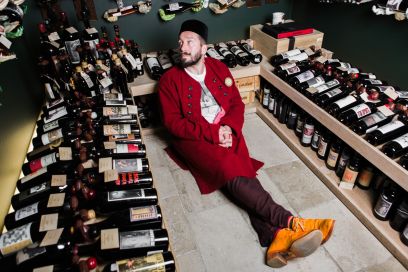What An Explorer Can Teach Us About Isolation

The first man to walk to both the North and South Poles, explorer Robert Swan OBE has plenty of insight into coping with isolation.

With most of the world under Corona-induced lockdown, facing weeks, if not months, of restricted movement, many may be wondering how to get through with sanity intact.
You might think a polar explorer is the last person to give advice about staying at home, but the opposite is true.
Yorkshire-born adventurer-turned-environmentalist Robert Swan OBE, is considered one of the great modern day explorers. But one of the toughest challenges of his life, he recalls, was having to spend nine-and-a-half months in a small hut on an Antarctic ice shelf with four near-strangers.
This was in the mid-1980's as they prepared for their Footsteps of Scott Expedition, a journey across Antarctica following the route taken by explorers Ernest Shackleton and Robert Falcon Scott. In order to successfully access the Antarctic continent via the McMurdo Sound, an ice-clogged water channel, their ship, The Southern Quest, needed to drop the team early before the sea ice made access impossible.
So the group remained isolated in a hut which measured 16 by 24 feet, for nine months’ time. They had to wait until the ice froze and made it possible for them to walk their journey.
"We were five, very different, strong, characters, including scientists who barely said a word and me who never shut up. It was dark and freezing most of the time and we had no internet or radio. On day one we didn't get on, but somehow we made it through."
When the winter had passed, Swan and his colleagues set out to walk 900 miles to the South Pole, which they did in 70 days without any outside aid and having hauled 350 lb (160 kg) sledges. They had achieved the longest unassisted march ever made.
He puts the success of their mission down to listening to each other despite their differences, and being honest with each other, "saying it how it is."
Swan is currently locked down again, this time by himself in California, away from his family. Here are his tips for how to get through this period of global self-isolation.
1. Have a plan
In difficult situations I try to focus as little as possible on the immediate and instead, come up with a plan for how we are going to manage our lives for the next 30 or 60 days, or however long we are in this situation for. It helps to motivate and inspire and to feel like we are going to move forward eventually.
2. Put it into perspective
OK, you might be running low on toilet roll but it is important to put it all in perspective. By and large, we have a smorgasbord of resources from food to entertainment to communication through the internet and phone. Just imagine living in fear with no resources and no support, and realise how lucky we are to be facing this with all we have.
3. Do something different
Take it as an opportunity to do something you wouldn't normally do, like practise a new skill. I have been learning Morse Code. I have also been talking to my neighbours, who shamefully, I have never taken the time to properly meet before. I've also been out on my bike on the hill trails every day. I'm seeing it as a chance to emerge from this period, fitter than I've ever been before.
Robert Swan is the first man in history to walk to both the North and South Poles. On both expeditions he experienced, firsthand, the effects of environmental damage on the Polar icecaps. This shaped Swan’s lifetime goal – to work for the preservation of the Antarctic as the last great wilderness on earth. He then founded 2041, an organization dedicated to this goal.
Robert Swan was interviewed by Robert Rubinstein, founder of TBLI, a sustainably investment organisation, and the TBLI Foundation.
To read more of Robert Swan's adventures buy his book here.




